Welcome to the next part in Anime Rants analysis of Revolutionary Girl Utena. The 39-episode series is divided into four sagas, or seasons. Today we are covering the third season, The Akio Ohtori Saga. As usual, this won’t be the most organized rant, but I’ve tried to keep it reasonable by putting it into several sections with different headings. Let’s begin.
The Student Council Saga (Arc 1 Analysis)
The Black Rose Saga (Arc 2 Analysis)
Spoiler Warning: This article contains Spoilers for Revolutionary Girl Utena’s third arc, the Akio Ohtori Saga. There may also be a few spoilers for the final arc, Apocalypse Saga.
Content Warning: This article mentions fictional sexual exploitation of minors, grooming, sexual harassment, and rape.
1) Akio’s Car and Sexuality
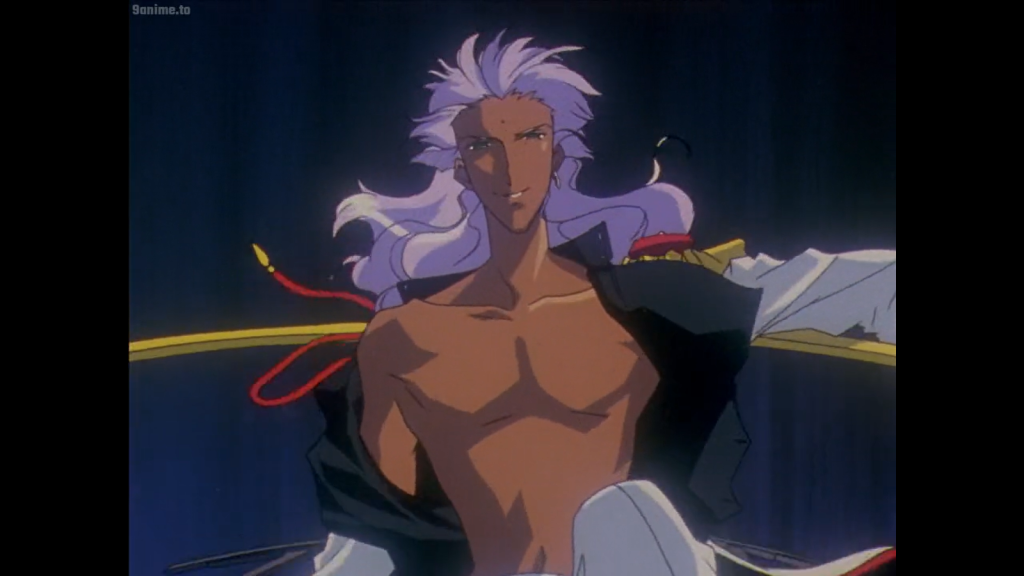
The tone of RGU has changed somewhat now that we know Akio is The End Of The World and our true villain. This saga focuses on the effects of the characters as Akio takes a much more active role in manipulating them for the next set of duels. One of the most prominent and important motifs in this saga is Akio’s red sportscar. The duelist of each episode is taken on a night time car ride with Touga and Akio, afterward undergoing a change in attitude. That’s the main format for setting up the duels this season. So, what does all this represent?
The car ride with Akio symbolizes sexual exploration and exploitation. Most of the characters in RGU are teenagers, but Akio is a grown man, and is using them all for his own ends. It might be a little too simplistic or literal, but I think Akio had sexual contact (and used emotional manipulation) with every single person he took for a drive. Sexuality is the basis of his manipulation in this arc. Of course, RGU isn’t perfectly clear about this. But if you watch carefully all the interactions in the car, you will probably pick up on the underlying sexual tension and story themes of sensual pleasure. This makes things pretty clear, considering that RGU’s narrative is usually even more vague.
The exploration piece is also worth considering and it is closely tied in with exploitation by Akio. Exploring your sexuality as an adolescent or teenager can feel very freeing, but it can also be dangerous. In that sense, being in a speeding convertible sportscar is an apt analogy. When exploring these things, you must set and stick to your own boundaries to reduce the chances of being taken advantage of. But these RGU characters are not the ones “at the wheel” of their exploration. Akio is the one driving, the one controlling and manipulating everyone and everything. Sexual predation is truly disgusting, and Akio is nothing if not a predator.
2) The Gondola and The Sword of Dios
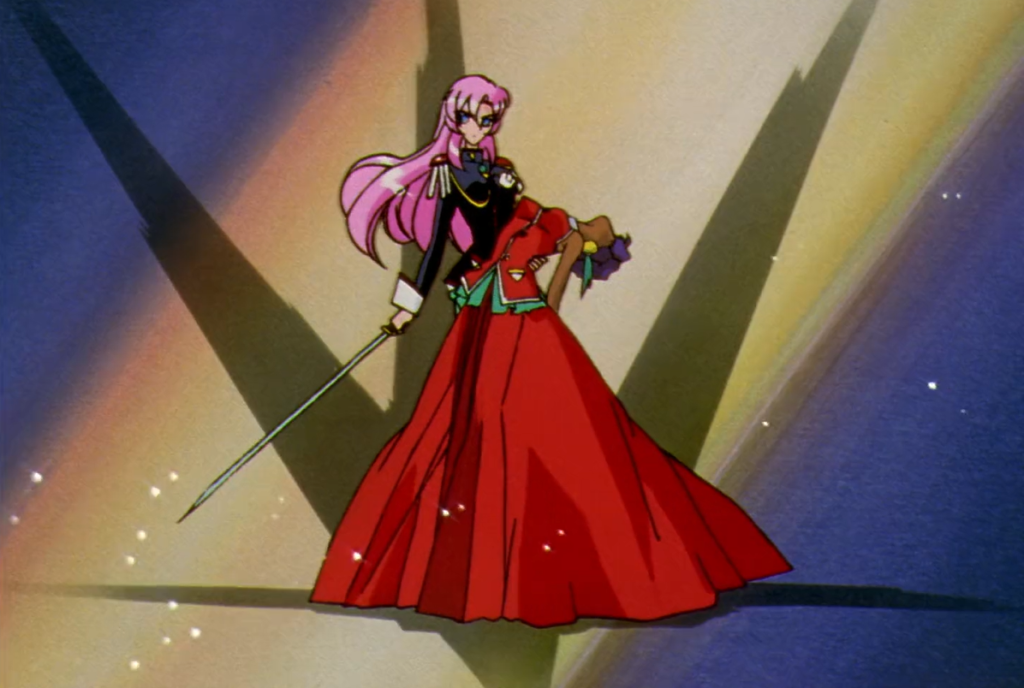
Another new and important point to discuss is the animation sequence showing Utena and Anthy riding the gondola elevator to the duel stage. To be honest, I’m not exactly sure what the meaning of this animation is supposed to be, but I can probably think of a few possible interpretations.
The animation sequence begins with Anthy already standing in the elevator. As Utena enters the elevator, Anthy vanishes, leaving her clothes in a pile. The elevator begins to ascend. After a few seconds we see a naked Anthy facing Utena. While her ceremonial red dress appears on her, Anthy sensually touches Utena to bring forth her fighting outfit. Utena was also at least partly undressed during those few seconds. Meanwhile, a rose bush grows out of the ground in the place where Anthy’s school uniform was left. By the time Anthy and Utena are both dressed and at the end of the elevator ride, the little rose bush has burst into full bloom. The two girls are now standing among many roses, ready to fight.
What does all this signify? Since this saga focuses so much on sensuality, it makes sense that the new animation is so physical. Although there may have been a small element of fan-service involved, I don’t think that’s the main point of the sequence. I think the most important meaning is pretty obvious: the growing relationship between Utena and Anthy. It makes sense for them to begin exploring sexuality with each other, which is why they dress and touch one another. The growing rose bush could symbolize not only their blossoming friendship, but also their physical closeness and sexual awakening. The extremely homophobic social environment in Japan may have prevented the creator, Ikuhara, from openly stating that these characters are homosexual or bisexual. Or that they are in a lesbian relationship with each other. But animation sometimes gives more freedom than scripts. That’s one reason why this animation sequence was important: to show that there are physical as well as romantic elements between Utena and Anthy.
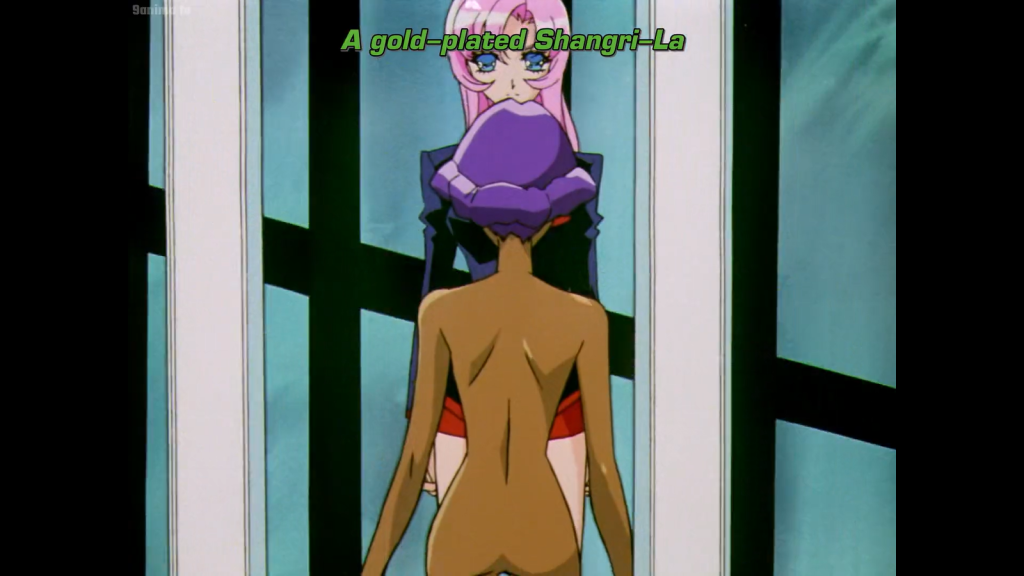
This isn’t the first time we have seen elevators in Utena. In the second arc, the Black Rose Saga, Mikage manipulated duelists within the confines of a small, descending elevator. Elevators and other modes of getting to the dueling arena could be symbolic of maturity or personal progress. Mikage’s methods brought people backward to their base instincts, so the duelists fell downward in an elevator. Normally, Utena walks up the stairs to the dueling arena, suggesting that she is maturing, but very slowly. The other duelists in the Akio Ohtori Saga arrive at the arena in a car; this suggests they are speeding forward too quickly and perhaps being reckless. Meanwhile, Utena and Anthy arrive via the open gondola elevator. This might mean they are progressing or maturing at a steady, healthy rate.
Let’s also look at what happens with the sword of Dios. Previously, Utena draws the sword, which symbolizes the power of the Prince, out of Anthy. However, Utena can no longer do this successfully in the third saga. Instead, Anthy pulls the sword out Utena and gives it to her. What does this mean? It makes sense in the lore of the Utena World. When Utena ceased to be able to pull out the sword, it was because Akio willed it so. He is linked to Dios, and can prevent Utena from accessing that power. But Anthy is also has a strong connection to Dios, so the sword can also be drawn out by her. The significance of Anthy pulling out the sword is that she is starting to take a stand against Akio. Anthy is usually forced into helping Akio manipulate people behind the scenes, but sometimes, she also chooses to slow down the progress of his plans. The sword is one example.
The Duelists and Brides

I’d like to spend a little time discussing the other duelists on the student council and their “brides.” First, however, I’ll explain why the Duelists use Brides this time around. Basically, a duo drawing power from each other has a better chance of defeating Utena and Anthy with their powers combined. Now then, let’s take a look at the first Duelist, Saionji. He was becoming skeptical of the dueling system and the End of The World. However, he once again allowed himself to be manipulated. He always charges into things impulsively and with overflowing enthusiasm. In this saga, Saionji fights Utena in order to gain something eternal, which he believes Akio can give. Saionji doesn’t fight with a “bride” in this duel, and his failure to defeat Utena is part of what makes Akio realize that a bride system is needed.
Although Saionji is largely a joke character, in my opinion, there are still interesting insights about him occasionally. One such insight is Touga’s theory that Saionji is primarily motivated by the hope of “true” friendship. That’s the eternal thing he plans to wish for. In particular, he seems to want to regain an honest relationship with Touga, like they had when they were children, before Touga became so manipulative. If nothing else, it’s clear that Saionji takes his bond with Touga very seriously, even while knowing that this supposed best friend is manipulative and condescending. I found this interesting, and began to watch Saionji and Touga’s interactions more closely after these events.
After a quick note about Touga, we’ll move on to Miki and Kozue. It becomes clear in this arc that Touga idolizes Akio and wants nothing more than to emulate him. When you think about how Touga has been under Akio’s influence for such a long time, you start to see why Touga is the way he is. This saga also makes it obvious that Akio and Touga sleep together at times. That would make Akio’s hold over Touga even stronger. Touga doesn’t fight with Utena in the Akio Ohtori Saga; his duel is delayed to the Apocalypse Arc. So that’s all we need to discuss about him for the time being.
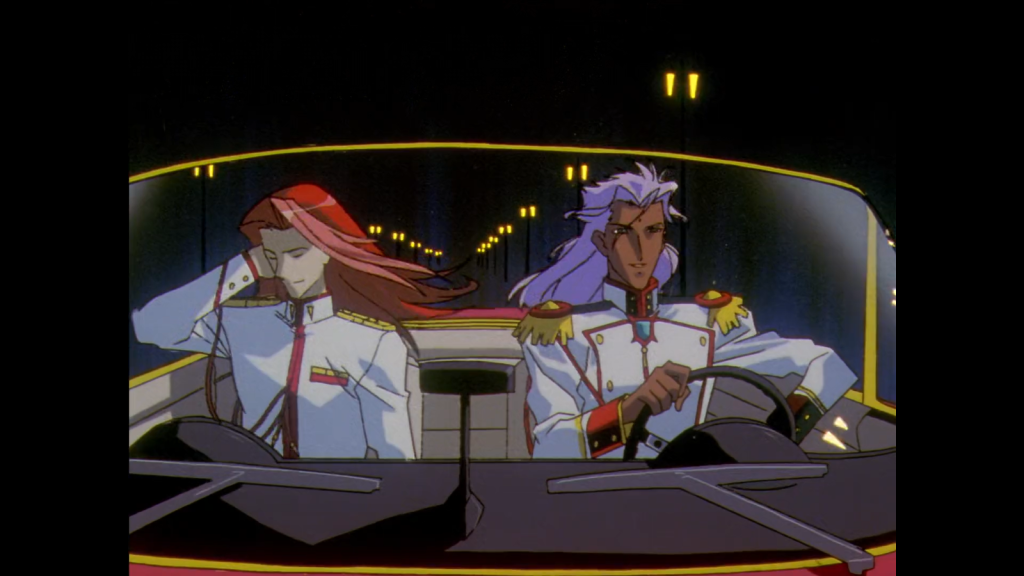
The Akio Ohtori saga gives us new details about Miki and Kozue. The former is a relatively simple character, overflowing with genuine goodness, sweetness, intelligence, and skills, as he seeks for “that which shines.” But Miki also has a significant weakness: he easily falls prey to manipulation. Despite insisting early on that he didn’t want to trust adults, he is eventually won over by Akio and Kozue. Miki’s goal is to possess his crush, Anthy. Kozue convinces him he must lose his “purity” (which I think means morals as well as healthy sexual caution) in order to survive in a world of “dirty” adults. In addition, Miki already believes that his “shining thing” is unattainable unless he fights for it. That’s why he agrees to fight Utena again with Kozue as his “bride.” As usual, it’s implied that Akio initiated sexual activities with Miki and Kozue in the car.
Miki is relatively easy to understand, but what about Kozue? She’s a bit more complicated and hard to make out. I find Kozue quite interesting even though she is generally a petty, unkind bitch. At the beginning of episode twenty-six, this girl takes a fall and mildly injures her leg whilst saving a nest of baby birds. The tree containing the nest was going to be cut down. Reportedly, Kozue sprung out the window and into the tree as soon as she heard this. This seems a bit out of character, but Miki remarks on their way home that Kozue has always been inconsistent in this way. She seems so heartless sometimes, but at other times, she shows an intensely caring and sensitive nature. So, what’s going on in Kozue’s mind in general? And what is her reason for roping Miki into another duel? Let’s address both questions one at a time.
Both Miki and Kozue’s characters are complicated by their family situation. Kozue in particular seems to have reacted badly to their parents’ divorce. The twins live with their father, but he is rarely home, since he travels all the time. Besides the divorce and possible neglect issues, there was also Kozue’s early trauma of failing on stage when forced to play piano without her brother. Now in the present, the twins’ father is supposedly remarrying; at the same time, a letter arrives in the mail from their mother. We don’t know the contents of the letter; only that its presence was treated with contempt by Kozue. She tosses it in the trash can without reading it, and refers to her mother as “that person.” Clearly, a number of family-related factors are weighing down on Kozue.

I believe Kozue suffers from a pervasive, overwhelming loneliness. Speaking as someone with Borderline Personality Disorder, I see some of myself in this character, and think it’s likely she deals with abandonment issues. From Kozue’s perspective, she was rejected by her mother, neglected by her father, and emotionally abandoned (to some degree) by her brother. In the first two arcs, we see Kozue’s desperation to get her brother’s attention and stir up his emotions. I think Kozue saved the baby birds because she could relate to their isolation and defenselessness. This was a touching act, but as we already know, Kozue’s sense of compassion is fickle. Her loneliness and perceived helplessness make her act out in angry, cruel ways.
What did Kozue hope to accomplish in the duel? As we saw in episode 26, she started flirting and being sexual with Anthy after Miki started fighting Utena. Since she did mention wanting the miraculous power of Anthy, it’s possible Kozue is simply power-hungry. Or maybe she was going to wish to make her family whole again, or her brother’s full and eternal attention. But there is also another interpretation. Kozue set up the duel just to upset Miki and make him see her sensual interactions with Anthy. In this twisted girl’s mind, it could be a way to “punish” Miki for perceived abandonment. After Miki lost the duel, Kozue angrily called him a coward. That’s the last we see of her in the Akio Ohtori saga. Once again, she’s proven to be difficult to understand, wanting to be treated better as she intentionally treats others horribly. I’m going to head-canon Kozue as a BPD character.
I don’t have much to say about Nanami, since her episodes were pretty straightforward; so all that remains is Juri. I’m not going to recap those two episodes about Juri, Ruka, and Shiori, but I wanted to make two brief points. First, Juri’s duel resulting in her being “freed” from her attachment to Shiori (or at least starting the process of becoming free of her). That’s the significance of the locket being destroyed. This development was obviously incredibly painful for Juri, but it will be good for her in the long term. It was bittersweet seeing this strong young woman so broken in the rain after the duel. She’s a great character that makes you want the best for her.

The second point related to this is about Ruka. One of the last parts in episode 29 shows us some schoolgirls talking about Ruka’s death. He had been terminally ill the whole time, and possibly shortened the time he had left by taking up fighting again. According to the rumor, there was a girl Ruka loved, and his goal was to use Anthy’s power to wish for that girl’s freedom. Juri has no idea. She absolutely hated Ruka (and he did some terrible things after all). But the likely truth is that Ruka loved Juri the entire time, and was trying to free her from the chains of the past tying her to Shiori. And ultimately, Ruka succeeded. That was a fascinating spin on a character I didn’t see coming at all. RGU never fails to impress.
Exploring Anthy in The Akio Ohtori Saga
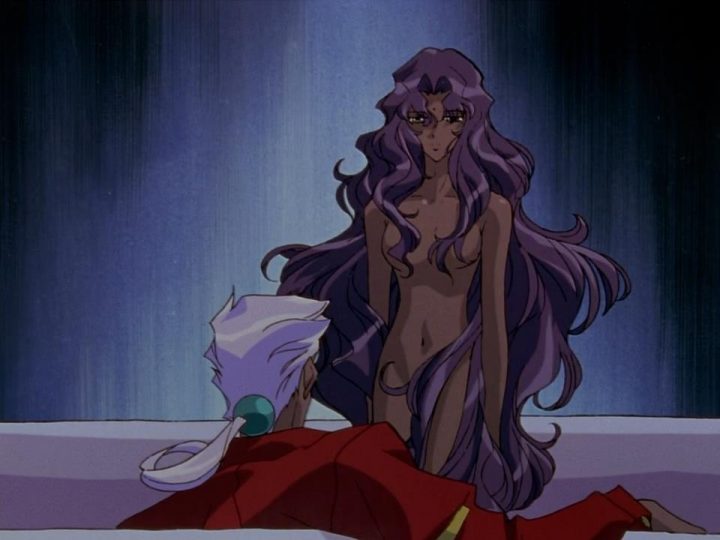
In the Akio Ohtori Saga, we see more content about Anthy than ever before. Anthy and Utena are now living together in Akio’s tower house. Arguably the most important reveal of the season was the fact that Anthy is frequently being raped by Akio. Sexual topics come up a lot in RGU, and especially in the Akio Ohtori Saga. The reason for this is twofold. First, RGU is a story about growing up. Sexual awakening and exploration are key parts of transitioning from child to young adult. Secondly, sexuality is seen so much in RGU because of the show’s focus on patriarchy and women’s roles in society. Sex is a powerful weapon and method of control that the patriarchy has traditionally wielded over women. Even in modern first-world countries, sexual abuse still happens, and most of time, it’s men abusing women. RGU has always been about fighting the systems in place that limit the characters, especially Utena and Anthy. So it’s fitting that the antagonist of RGU is a sexual predator and abuser who targets both of them.
The abuse of Anthy is an important way in which Akio controls her and keeps her attached to him. There’s no question that Anthy feels emotionally obligated to Akio, which is why she rarely defies him. The Apocalypse Saga explains more about the past of Anthy and Akio/Dios, but for now, all we have to go on is a flashback of young Anthy crying and embracing Dios, telling him, “From now on we’ll live to help each other.” It’s clear that at some point, Anthy did truly love Akio/Dios, and thought of him as her prince. However, the one she serves is no longer Dios, but only his empty shell Akio, devoid of morals. Anthy knows this and yet can’t let go. It’s mostly because she’s being manipulated, but part of it is also Anthy’s own desperation for the old prince and the pity she feels for the empty shell left behind. That’s what I think anyway.
Continuing with Anthy-related topics, I will be covering a number of thoughts that she expressed in this Saga. But first, let’s take a quick look at the unique bed shared by Utena and Anthy. The bed is made of two half circles slightly offset from each other. Utena and Anthy sleep facing one another. Some have suggested that the bed is designed this way to show that Utena and Anthy are in opposing positions, or that one or both of their perspectives are skewed. Someone (or both) is metaphorically seeing the world upside down. Also, even though Utena and Anthy are so close to each other, something is keeping them in opposing angles (Akio). With that out of the way, let’s glance at Anthy’s general attitude about living with Utena.

It’s hard to know what Anthy is thinking and feeling since she always acts like nothing is wrong, expressing only empty smiles. For Utena to live with Anthy, there will be several practical problems like trying to hide the fact that Akio rapes her frequently. There will also be the inevitable danger of Akio grooming and courting Utena. There may be unexpected feelings arising as well, such as jealousy of Utena or Akio. Anthy also does most of the cooking and cleaning. With this amount of considerations, a normal person would probably feel stressed. However, Anthy seems happy. And I don’t think it’s only her faked, empty “happiness.” The main evidence is how Anthy becomes slowly more expressive and honest around Utena than before. (Also, in the next arc, she says she wishes this time living together would last forever.) All in all, living togther is helping Anthy grow closer to Utena.
Next we will explore some specific thoughts that Anthy shares in the Akio Ohtori Saga. In episode 25, Utena talks about how Akio seems somehow familiar to her. Anthy replies, “There are times, Miss Utena, when you feel very familiar to me.” I believe this rare insight has a double meaning. First of all, we know from the Apocalypse Saga that Utena and Anthy saw each other before, long ago, as children. So Anthy literally remembers Utena. The other meeting is that Utena seems familiar because she reminds Anthy of Prince Dios. The Prince represents strong morals, altruism, and courage. Although Akio has long since ceased to be Dios, the spirit of the Prince is still around. And the one who resembles him most strongly is, of course, Utena.
In episode 26, Anthy remarks that Akio is more like her father than a brother. I’m not entirely sure what this means. Either way, Akio is treating her terribly. I think it might mean that Akio is fatherly in the sense of having authority. His word is law. Anthy has to do what he says.

Another important Anthy thoughts happens in episode 29, after Utena expressed that she didn’t understand Juri’s actions with regards to Shiori. Anthy suggests that Juri’s apparent coldness is one part of her true feelings. Utena is a simple existence in some ways, and doesn’t understand the nuances of emotions and mixed loyalties yet. She doesn’t understand how something can be “part” of one’s true feelings. Shouldn’t feelings be whole? In response, Anthy says, “At times, people will say things they’d normally never say, or do things they’d never do.” When Utena asks if Anthy does this too, the Rose Bride comes close to expressing her true feelings. But she catches herself and says, “Never mind.” (That also happened once before, in episode 25.)
The meaning of this exchange is highly important for the future as well as understanding Anthy in general. The Rose Bride has mixed feelings about Utena, Akio, and herself. Should she keep obeying Akio? Should she tell Utena how she’s been part of manipulating the duels to happen? Does she herself truly have will and choice, or is she just a heartless doll? Later on, the Apocalypse Saga, Anthy will end up betraying Utena. This is an example of her “doing something she would never normally do” because she’s still being controlled by Akio. We know Anthy is really a sweet girl who wants nothing more than to take care of roses and animals.
In episode 30, there are several times when we see responding or reacting to Akio’s overt “courtship” of Utena. Though she always smiles sweetly and says, “Yes, big brother,” it’s pretty clearly forced, at least in some cases. On several occasions, when Anthy sees Akio being physical with Utena, her expression becomes hidden. Her eyes are invisible behind the glare of her glasses, and shadows hide the exact look on her face. In anime, in cases where characters with glasses are mysterious or emotionally distant, we often see the glare of the glasses and no eyes. It’s normally done to signal the audience that something isn’t right with that character, which makes sense for Anthy. She must be feeling quite a lot of complicated emotions as she watches Utena fall into Akio’s hands. It’s possible she feels a mix of worry, jealousy, guilt, and frustration. Rather than express any of those feelings, however, she stays distant in the classic Anthy way.
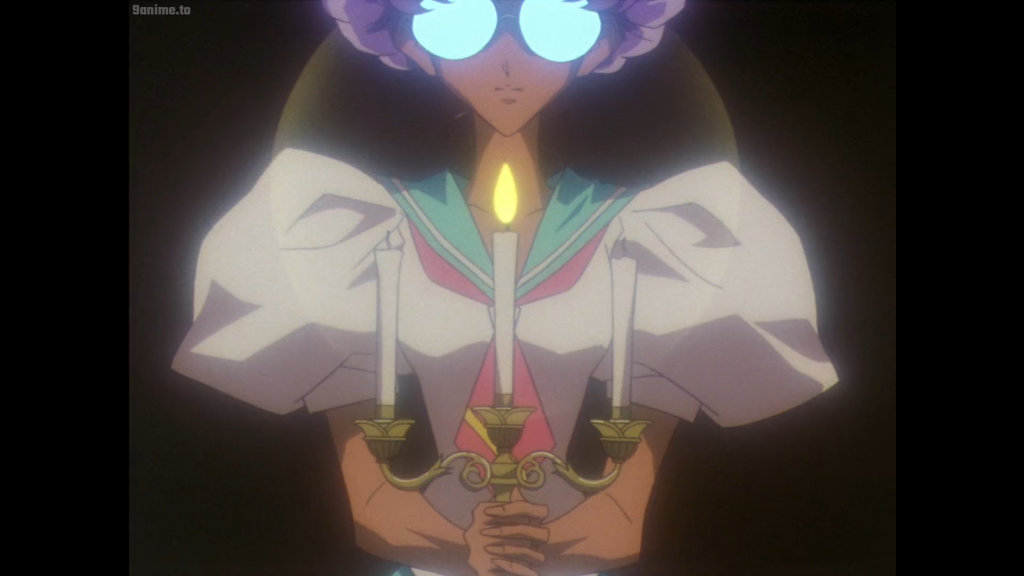
Episodes 31 through 33 are fairly quiet as far as Anthy is concerned. I did, however, forget three instances earlier where the Rose Bride did something worth noting. First was the part in episode 25 where Anthy once again proved her agency. She saved Utena during the battle with Saionji. She also defied Akio by drawing the sword from out of Utena and giving it to her. That was awesome to see.
In episode 26, Anthy gives directions to Miki and Kozue about how to take care of the baby birds. Utena observes that Anthy is rarely that direct. It’s more evidence that she’s highly interested in animals. Also in episode 26, Anthy confides to Akio that she is having trouble understanding what Utena meant when they were talking about Miki. Unfortunately, Akio begins sexually harassing her before we get to the bottom of that matter. I think the point of it was to show that Anthy is actively trying to understand Utena as much as possible; that she’s genuinely interested in Utena.
Akio’s Manipulation and Utena’s Candles

We’ve already talked some about Akio in general, as well as his abuse of Anthy. Next I want to cover his pursuit of Utena. Over the course of RGU’s third arc, Akio sexually and romantically courts Utena. The naïve Utena believes she is truly falling in love. She also believes Akio is genuinely interested in her. In reality, Akio only wants Utena’s power and the sword of her soul. She is only a means to an end. But Akio is a master of manipulation and preys on Utena by appealing to her in multiple ways. One example is when he “saved” Utena from being lectured by the school authorities over her uniform. Akio told off the teachers, asking them not to be so restrictive with rules, and led Utena away. He complimented her “gallant style,” and acted very charming. It’s no wonder Utena started to be swayed by such good acting.
By manipulating Utena and continuing to abuse Anthy, Akio is getting closer to his goals of taking their powers. He’s also driving a wedge between the two girls, most likely because he is threatened by the strength of their relationship. Akio is the opposing force between Utena and Anthy, keeping them still at a slight distance from each other.
During episode 30, visual symbolism is used to show the slow failing of Utena’s resistance to Akio. The imagery used is three candles. It was difficult for me to figure out exactly what each candle means, but I think the more important point is that the candles together represent Utena falling for Akio. Personally, I think the candles stood for Utena’s reasons why she shouldn’t fall in love: 1) Akio’s engagement, 2) loyalty to her Prince, and 3) loyalty to Anthy. But all three candles eventually go out by the end of episode 30. After this, there are a few episodes about Nanami, followed by episode 33, wherein Utena and Akio sleep together. This was largely because of the breakdown of Utena’s resistance in the previous episodes.

Closing Thoughts: Truth in RGU and Akio as Amazing Villain
The Akio Ohtori Saga is not an easy anime arc to watch. It’s rife with sexual abuse, misogyny, emotional manipulation, and people making bad decisions. But all those things are necessary not only to the plot of RGU but also to the themes and motifs of the story. RGU is largely a depiction of unfortunate truths about the world and human society. That’s why there is so much content that’s hard to watch. But the important thing is that someone is there fighting the systems in place and trying to bring revolution. Even if it’s hard– even if it’s impossible– Utena is a character who never stops fighting for what’s right.
I believe it’s also important to note that Akio is a truly exceptional anime villain. He’s one of the best antagonists in all of anime, in my opinion. The following paragraph on that topic is credited to my good friend Nat, who always has good insights to share about RGU.
Akio is exceptional and terrifying because he is “real.” He never laughs about his villainy. He never has an “I am so EVIL!” moment. On the contrary, Akio is charming, disarming and knows how to get into peoples’ minds and manipulate them. Then he uses this power to victimize minors and people with less power than him. Akio tramples on everyone around him without any regard, because he is free of consequences. People like Akio exist. You could know someone like Akio and you wouldn’t even know it. That’s why we hate him so much: he is everything that is currently wrong with the world, condensed into one single character.

That’s all for today, so thanks so much for reading. Join me next time for the final arc, Apocalypse Saga!
–

3 thoughts on “The Akio Ohtori Saga- Revolutionary Girl Utena Anime Rant”